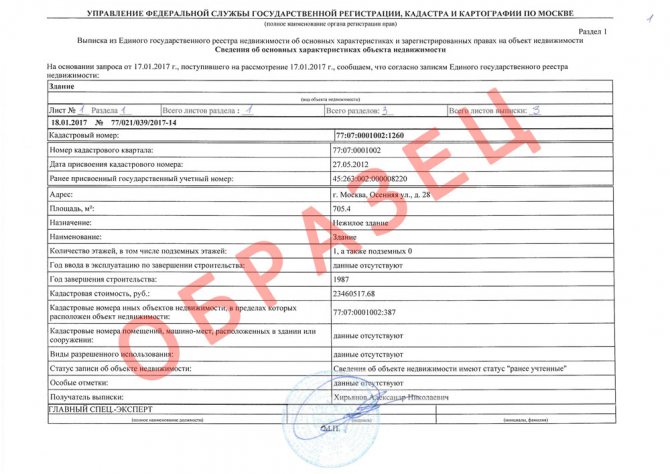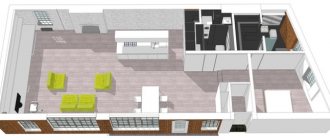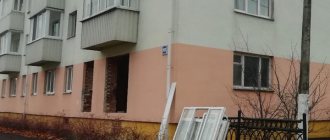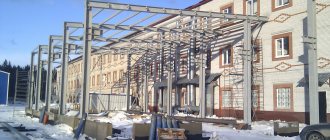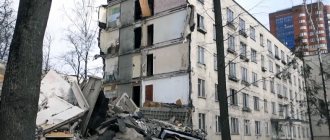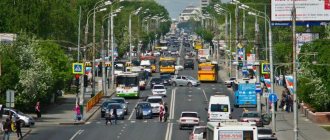Features of redevelopment in non-residential premises
Premises whose functional purpose is defined as “non-residential” are used for trade, offices, production or public institutions. They can be part of non-residential buildings or apartment buildings. The approval algorithm depends on the type of building the premises are located in. Let us highlight the most important rules for carrying out and approving redevelopments:
- Redevelopment includes any change in layout (configuration) - this includes changing the location of walls and structures, erecting and dismantling internal elements, and other work;
- legislation allows for simultaneous reconstruction and redevelopment, i.e. allowed to combine them in a single project;
- the decision on the need to perform work is made by the copyright holder, while the tenant has the right to do it only with the consent of the lessor.
Although the approval or legalization of the redevelopment of non-residential premises differs for non-residential buildings and apartment buildings, they have a number of common features. Work may be carried out only after the preparation of project documentation, which can be produced by a company that is part of the SRO. The last stage of the procedure will be the same - technical documentation is issued. plan for the changed layout, cadastral registration and adjustment of the Unified State Register are carried out.
Expert opinion. Coordination of reconstruction differs from the same procedure for redevelopment work. During reconstruction, the basic characteristics of the structure change, or work is carried out on load-bearing elements, components, structures. Therefore, it is necessary to undergo an examination of the project and issue a permit document at Gosstroynadzor.
During redevelopment, you can change the configuration of the room, including demolishing or erecting walls, changing the dimensions of window and door openings. These works are described in the project.
Is it necessary to coordinate the redevelopment of non-residential premises?
Coordination of redevelopment in a residential building is a mandatory requirement of the law. Based on the list and type of planned work, the approval process may include:
- obtaining consent from the owners of other premises of the apartment building (if the planned work will be carried out on common property);
- drawing up a technical report for load-bearing structures;
- transfer of documentation to the Moscow Housing Inspectorate (MZHI), which must approve the project;
- contacting the BTI after completion of the work to make adjustments to the registration certificate.
There is no need to obtain special permission to redevelop non-residential premises in a non-residential building. In this situation, the project is approved by the copyright holder of the object, after which you can begin the work yourself or hire a contractor.
If work is carried out without ordering a project, or in violation of other legal requirements, you may face an administrative fine. Unauthorized redevelopment of non-residential premises is usually detected during scheduled and extraordinary inspections of the Ministry of Housing, the State Inspectorate for Real Estate, and other bodies. Owners of neighboring premises and other interested parties also have the right to report violations. If you do not want to encounter such problems, order support from our company in coordinating the reconstruction and redevelopment of non-residential premises.
Calculator of the cost and timing of our services - here
What is the difference between redevelopment of a non-residential building?
The configuration and layout of the building can also be changed during redevelopment work. For example, in this way you can create several new premises from the total volume of the building and register them. Coordination of redevelopment in a non-residential building has a number of features:
- the decision must be made by all rights holders of the building (usually this is done in writing);
- it is necessary to order a project that will describe all types of work and planning decisions, and instructions for safety measures;
- after approval of the documentation by the owner, construction work on the site can begin;
- after receiving the work acceptance certificate, it is necessary to conclude an agreement with a cadastral engineer and obtain a technical plan;
- at the final stage, documents are submitted to Rosreestr in order to enter new data into the Unified State Register of Real Estate and receive an extract.
Redevelopment in detached buildings often includes facade work, which requires special permission. For example, for façade work in the capital, the project is submitted to the Moskomarkhitektura to confirm compliance with the artistic and architectural appearance. Similar requirements apply in other localities and constituent entities of the Russian Federation.
Expert commentary. The redevelopment of the administrative building will include work on several of its premises. There is no need to order separate projects for each room, since the designer will indicate solutions and descriptions for all types of work. Since controversial issues often arise when distinguishing between redevelopment work and reconstruction, we recommend that you contact our company for a consultation regarding such nuances.
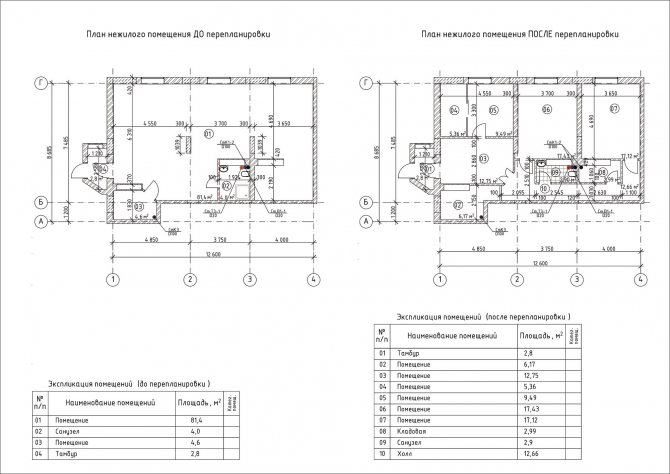
The graphic materials of the redevelopment project describe the configuration of the premises before and after completion of the work.
What types of work are considered redevelopment in non-residential premises?
It is very difficult to list all types of work that are considered redevelopment in non-residential premises, let’s consider the most common:
- displacement of any partition;
- violation of the integrity of the wall;
- extension of any building;
- project change;
- increasing the internal space by removing the wall;
- dividing the room by erecting a partition;
- adding a separate entrance/exit by destroying a wall, etc.
All of the above types of repair work relate to redevelopment, and their implementation requires mandatory permission from special authorities. The location of non-residential premises is also of great importance. If it is detached, obtaining permission for redevelopment is much easier than if it is located in residential buildings.
Regulatory acts
Legislation on the redevelopment of non-residential premises in a non-residential building or apartment building includes:
- Civil Code of the Russian Federation () - regulates the requirements for work on sites, execution of documents and permits;
- Housing Code of the Russian Federation () - includes instructions for the approval of work in residential areas. fund;
- Law No. 384-FZ () - contains safety standards for all types of buildings;
- Law No. 218-FZ () - describes the procedure for making changes to the Unified State Register, accounting and registration;
- Order of the Ministry of Economic Development No. 953 () - contains rules on the procedure for drawing up a technical plan for real estate.
SP, GOST, SNiP, NPB, and other guidelines are used to describe design solutions, work and safety measures. All regions have their own regulatory framework for the redevelopment and reconstruction of non-residential premises. For the capital, this list includes Resolutions No. 508-PP, No. 432-PP.
| No. | Basic concepts you need to know for redevelopment approvals | Description |
| 1 | Redevelopment | Construction work in a room or building that involves a change in configuration. For the redevelopment of premises in an apartment building, approval goes through the Ministry of Housing. For non-residential buildings, the project is approved by the customer himself. |
| 2 | Technical plan | The main document on the basis of which the object undergoes cadastral registration after the completion of redevelopment. The technical plan is prepared by a cadastral engineer after examining the building. |
| 3 | Cadastral engineer | A professional specialist who has the right to draw up a technical plan for the premises after redevelopment. A cadastral engineer must have a qualification certificate. Information about all engineers is in the Rosreestr database. |
| 4 | Registration of rights | The procedure during which Rosreestr enters information about the copyright holder of an object into the Unified State Register of Real Estate. Registration can be carried out simultaneously with cadastral registration, or separately from it. |
| 5 | Cadastral registration in case of changes in the object. | The procedure during which data is entered into the Unified State Register of Real Estate after reconstruction or redevelopment of an object. For cadastral registration of changes, you need to draw up a technical plan and contact Rosreestr. |
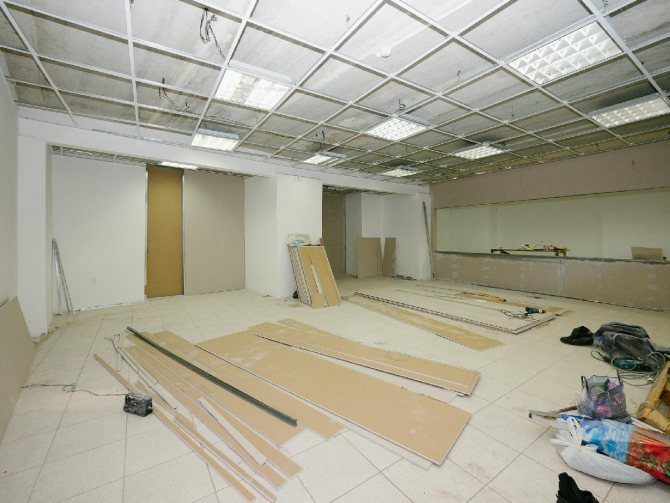
The easiest way to carry out redevelopment is in a large room where there were no structures initially. There you can redistribute the area using walls, partitions, and decorative elements.
The cost of coordinating the redevelopment of non-residential premises.
The following factors influence the determination of the cost and timing of approval of the redevelopment of the premises:
- purpose of the premises;
- historical value of the building;
- the area of the city in which the building is located;
- complexity of architectural elements and redevelopment solutions;
- compliance of redevelopment with fire and sanitary standards;
- presence/absence of new openings, windows and entrances;
- laying water supply and ventilation systems;
- supply of electrical and gas lines, etc.
- the presence of complaints, orders, refusals and suspensions in attempts that have already been made to coordinate the redevelopment ourselves or at a very low cost;
For a preliminary assessment of the cost, timing and stages of the procedure, you must send the following copies of documents and information [email protected]
- a copy of the technical passport of the premises, building or floor plan with an explanation according to the latest technical inventory of BTI or RTI;
- an extract from the Unified State Register with graphics - the same plan “in schedule” as the BTI, only from the Unified State Register;
- a sketch of the planned changes or a design project, maybe a measurement plan with a new layout;
- accompanying important information if there are nuances regarding the situation.
We will undertake to carry out both individual stages of the approval process and full support for turnkey redevelopment. We have extensive experience in coordinating issues related to non-residential assets, objects of the City Property Department, and the Federal Property Management Agency, which allows us today to carry out extraordinary tasks in a short time. We work with cultural heritage sites and architectural monuments to develop projects for adapting OKN to modern use.
You can find out more about the service for coordinating the redevelopment of non-residential premises by phone or by sending a request using the form on the website, indicating your contact information for feedback.
The procedure for redevelopment of non-residential premises
Redevelopment of premises in a non-residential building or apartment building can begin only after the preparation and approval of project documentation. Please pay close attention to this legal requirement. We do not recommend relying on the legalization of already completed work, as this always entails additional nuances and problems. If the work poses a threat to the strength and reliability of the structure, or does not comply with the law, legalizing the redevelopment of a non-residential building will generally be impossible.
The consent of the owners to the redevelopment of non-residential premises must be formalized in writing. For work on MKD structures, the specified consent is accepted at a general meeting and recorded in the minutes. Please note that the owners of apartment buildings cannot be forced to approve redevelopment work. For this reason, you will have to look for a compromise and convince the meeting participants.
Redevelopment project for non-residential premises
The main document for approval is the project. It must be ordered under an agreement with companies included in the SRO. By contacting us, you will receive documentation developed in strict accordance with the law. The redevelopment project for non-residential premises includes the following sections:
- explanatory note describing the current state, parameters and features of the object;
- description of planning solutions, list of upcoming works;
- calculations of loads on structures, descriptions of solutions for their strengthening and strengthening;
- description of safety measures for the period of work;
- regulations for the characteristics and types of construction and finishing materials and equipment;
- graphic materials – drawings, plans, diagrams;
- estimate documentation, specifications.
The redevelopment project for non-residential premises is prepared digitally for approval. The initial data for design is taken based on the results of the inspection, survey, request for information from the Unified State Register of Real Estate and materials from the BTI archive. The cost of a redevelopment project for non-residential premises depends on the characteristics of the planned work and the object.
Calculator of the cost and timing of our services - here
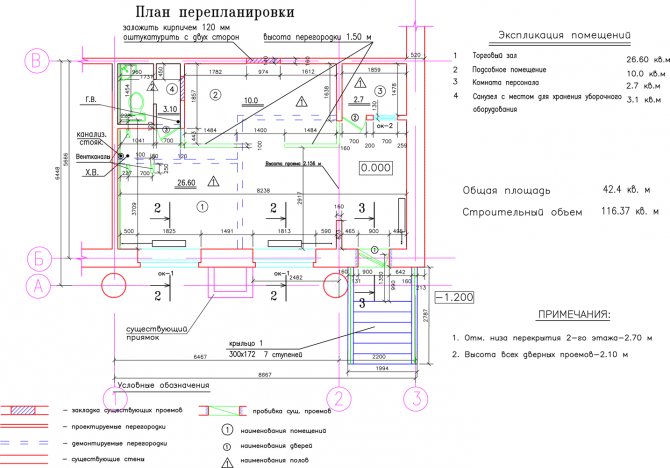
Pay attention to the conditional lines on the diagrams and project plans. They are used to make documents easier to read.
Where to order a project
We recommend that you contact our company for the preparation of project documentation. Our staff of designers will complete the work on even the most complex projects. a project for the redevelopment of non-residential premises, which has successfully completed all procedures, can be found in the list of useful documents.
Where does the approval of redevelopment of non-residential premises take place?
The rules for redevelopment in MKD premises oblige you to contact the MZHI. You must contact the same department after completing the work to receive a commission certificate. Redevelopment in a non-residential building can be carried out without permission from the Ministry of Housing. The project and the act are approved by the customer himself.
How to approve redevelopment in Rosreestr
Regardless of the functional purpose and status of the premises, changes after completion of work must be reflected in the Unified State Register of Real Estate. The algorithm of actions includes the following steps:
- with a certificate of completed work, you must contact an engineer and conclude an agreement for the production of a technical plan;
- during the examination and analysis of documents, the engineer will determine new parameters of the premises, describe them in sections of the technical plan, on the floor plan;
- the technical plan is made digitally and submitted to Rosreestr;
- Rosreestr officials transfer information from the technical plan to the Unified State Register of Real Estate, after which they issue the applicant an extract.
Redevelopment of non-residential premises is always completed by registration in Rosreestr. In this case, the project does not need to be submitted to Rosreestr.
Expert commentary. The algorithm for approving the redevelopment of non-residential premises in apartment buildings requires entering new data into the technical passport of the BTI. You need to go there after finishing the work. There is no need to submit a technical passport to Rosreestr.
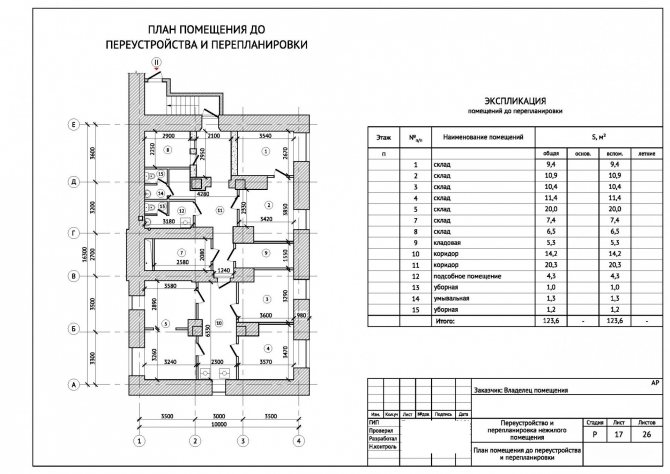
In this example, a floor plan was made for the premises after redevelopment.
The price of legalizing the redevelopment of non-residential premises.
Such a room can be built-in or attached to a residential building, or it can be located in a non-residential building. This greatly affects the cost of legalizing the redevelopment of non-residential premises and the procedure itself. Also, the price is determined by the type of activities performed, the footage of the object and other factors. To clarify the cost of your case and receive a commercial offer, call us at 8-495-507-74-67 or send to our email address any plan of the premises in question before and after the reconstruction. We will definitely answer you!
Is it possible to legalize the redevelopment of non-residential premises after work has been carried out?
Let's look at how to legitimize the redevelopment that has already been done. To confirm the safety of the work performed in the MKD, technical documentation is issued. conclusion on the safety of load-bearing structures. It can be issued by the author of the MKD project, or by a specialized organization. New parameters will be indicated in the technical plan prepared by the engineer.
If the documents confirm the safety of the completed work, all procedures can be completed without trial. However, government officials often “play it safe” and refuse legalization for far-fetched reasons. Such a refusal must be appealed in court. To do this, an administrative claim is submitted, a technical plan with an engineer’s conclusion, and a technical report on load-bearing structures are attached. According to the court decision, Rosreestr employees will conduct records and update the Unified State Register.
Features of approval in Moscow
To legalize the redevelopment of non-residential premises in Moscow, not only the norms of the Housing Code of the Russian Federation and the Civil Code of the Russian Federation are applied, but also the capital’s Resolutions No. 508-PP, No. 432-PP. The following structures participate in the approvals:
- Moszhilinspektsiya – reviews the documentation for work in the apartment building, gives approval, issues a commission act;
- Moskomarkhitektura - participates in approvals if work is planned on external facades;
- State Budgetary Institution “MosgorBTI” - makes changes to the technical passport after completion of redevelopment work;
- State Budgetary Institution “Expert Center” – issues a technical report on the safety of load-bearing structures.
At the final stage, you can submit the documentation directly to Rosreestr or to the MFC. Also in the capital, applications and documents for approvals can be submitted through the website mos.ru.
Calculator of the cost and timing of our services - here
Expert commentary. A full range of services for design and coordination of construction work in Moscow will be provided by specialists from our company. Our specialists will explain how and where to coordinate the work and prepare all the necessary documents. Preliminary prices for our services can be found in the table below.

The project calculates loads on supporting structures. options for their strengthening are described. This work will be performed by a contractor.
Coordination of redevelopment of non-residential premises. What documents are needed?
In most cases, to coordinate the upcoming redevelopment of non-residential premises located in separate buildings, the following documents will be required:
- power of attorney for representatives of our company;
- redevelopment project prepared by a design organization that has an SRO;
- technical conclusion on the possibility and safety of reconstruction;
- additional sections of project documentation (if necessary);
- development of a project for changing the facade and coordination with the Moskomarkhitektura for changing the facade , such work is planned;
- technical plan of the premises prepared by a cadastral engineer registered in the national register;
If the non-residential premises are located in a residential building or in its built-in or attached part, then the set of documents will be larger and the approval procedure is much more complicated. The list of documents will be supplemented by:
- technical conclusion from the State Budgetary Institution “Expert Center” or from MNIITEP if in the process of reconstruction it is planned to affect the load-bearing structures of the premises or buildings;
- positive conclusion of Rospotrebnadzor or SES ;
- the consent of the Management Company or operating organization may be required;
- if the changes concern the facade , a protocol of the meeting of owners of common property will be required with a positive decision on the issue of changing the facade by a quorum of at least 2/3 of the owners;
- if the façade is changed, the design solution must be approved by the MCA, which the Moscow Housing Inspectorate receives as part of interdepartmental interaction.
It is worth noting that each case has its own nuances and variations in resolving this or that issue regarding the approval or legalization of an already completed redevelopment.
Does it take long to read the description?
Call +7 , we will immediately answer all questions. Write a request to [email protected] with a clearly described essence of the question or task, we will answer.
List of useful documents
Documents for download:
| No. | Links | Description |
| 1 | Sample technical report | |
| 2 |
| Sample USRN extract |
| 3 | Sample technical plan | |
| 4 | Sample redevelopment project | |
| 5 | Sample application for approval of redevelopment | |
| 6 | Application for cadastral registration | |
| 7 | Instructions for the applicant when submitting documents to the MFC | |
| 8 | Sample terms of reference for redevelopment |
Our services
Our company will help you quickly coordinate any type of work. We guarantee our clients:
- preparation of all necessary documents, support at every stage of procedures;
- consulting support, selection of planning solutions that comply with legislation;
- affordable prices for all types of services, individual commercial proposals for each customer.
When concluding a contract, you can check examples of our work. This will help you make the right choice.
Price
The cost of redevelopment of non-residential premises includes the costs of preparing the project, preparing technical equipment. conclusion and technical plan. Checks of documents in MZhI and cadastral registration in Rosreestr are carried out without paying a fee. You can see how much a non-residential redevelopment project and other services of our company cost in the table.
| No. | Service, document | Price |
| 1 | Redevelopment design | from 12,000 rub. (depending on the area and features of the object, type of work) |
| 2 | Support for redevelopment approvals | from 10,000 rub. |
| 3 | Preparation of a technical plan | from 8000 rub. |
| 4 | Support of the cadastral registration procedure in Rosreestr or MFC | from 12,000 rub. |
| 5 | Drawing up a technical report | from 15,000 rub. |
Types of redevelopment of non-residential premises for business purposes
Redevelopment of a rented premises or a property that is owned can be carried out. That is, the entire procedure for approving and drawing up a project is carried out either by the tenant or the owner himself. In the first case, in addition to the rest of the documents in the package, you must obtain the landlord’s permission to undergo legalization.
Redevelopment can be relatively simple, that is, the functions of the property are preserved. In this case, the legalization procedure is not much different from that established for apartments. They speak of a complex change in layout when the purpose of the premises has to be completely changed, and for this it is necessary to go through many more authorities than in the first case, to ensure the legal purity of the repairs carried out.
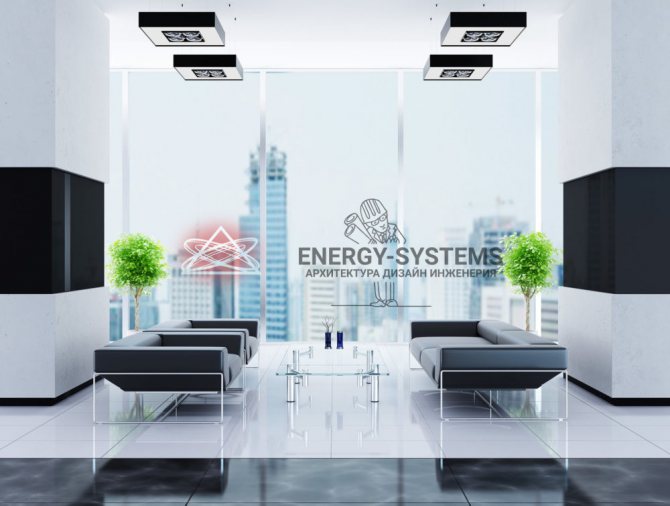
conclusions
- Redevelopment of non-residential premises consists of changing its characteristics and configuration.
- Before the work begins, a project is drawn up, and after the repair is completed, a technical plan is prepared and registration is carried out in Rosreestr.
- If the redevelopment is carried out in an apartment building, approval will take place in the MZhI. This is not required for work in non-residential buildings.
- To update information in the Unified State Register of Real Estate after redevelopment work, you need to order a technical plan from a cadastral engineer.
If you need to get approval for redevelopment, order services from our company. You can learn more about our services at a free consultation.
Coordination of already completed redevelopment of non-residential premises.
to legalize the completed redevelopment of non-residential premises, but you will have to pay a fine for violating regulations and legislation. In accordance with the norms, you must first obtain permission and then do it, and not vice versa. Hence the penalties. In addition, the risk of receiving a suspension or refusal increases after submitting documents for approval or making changes to the Unified State Register if the changes made violate urban planning norms and rules. It is possible to legalize the completed redevelopment without a fine if the actual changes are not recorded in the Unified State Register, BTI and if there are no instructions regarding planning from regulatory authorities or complaints from residents or owners of neighboring premises. Also, owners of non-residential premises located in separate non-residential buildings are not fined.
Does it take long to read the description?
Call +7 , we will immediately answer all questions. Write a request to [email protected] with a clearly described essence of the question or task, we will answer.
